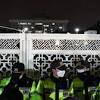South Korea
2024 - 12 - 4Martial Law in South Korea: The President's Late-Night Surprise!
Democracy in South Korea - Martial Law - North Korean Forces - Political Drama - South Korea - South Korean Parliament - Yoon Suk YeolBrace yourselves, South Korea: President Yoon’s dramatic declaration of martial law has everyone talking! What’s next?
In a shocking late-night television address, South Korean President Yoon Suk Yeol declared martial law, igniting controversy and staunch opposition from both the public and his political allies. The president accused opposition parties of holding parliament hostage, stating that this unprecedented move was essential to maintain order and security within the country. Critics, however, argue that the declaration highlights Yoon's inability to navigate the political landscape and fear it could lead to an erosion of democratic principles.
As tensions mount, the South Korean National Assembly swiftly responded by passing a resolution demanding the revocation of the martial law declaration. This democratic pushback illustrated the power struggle between the legislature and the presidency, with many lawmakers questioning the legitimacy and rationale behind Yoon's drastic measures. Jeong Jae-ho, an influential political analyst, suggests this could be a turning point in South Korea’s already volatile political environment, which is characterized by deep divisions and rising dissatisfaction with the ruling administration.
Yoon's declaration is aimed primarily at eradicating what he refers to as pro-North Korean forces, a claim that has drawn criticism for its vague implications. Many locals, feeling uneasy about the return of military rule, are concerned about the potential consequences for civil liberties and free speech. As discussions unfold about the definition and identification of these so-called pro-North groups, many citizens are left wondering what this means for their day-to-day lives.
As South Korea braces itself amidst the political upheaval, the clock is ticking on Yoon’s declaration of martial law. The parliament has called for the president to lift the martial law, and the nation watches as protests and demonstrations erupt in response to the drastic measures. South Korea's recent history has shown how quickly political transitions can shift, leading many to ponder the future of leadership in a nation that has prided itself on its democratic values.
In a somewhat related twist, did you know that South Korea has experienced martial law before? Notably, during the late 1970s and early 1980s, martial law was used by the government to suppress dissent and curb political movements. The impact of such measures still resonates in the nation’s collective memory today. Additionally, South Korea continuously grapples with its complex relationship with North Korea, making political decisions all the more impactful regarding national security and public opinion.

Why has South Korea's president suddenly declared martial law? (BBC News)
The move - invoking temporary military rule - has been roundly condemned by opponents and some within his own party.

South Korea President Yoon Suk Yeol declares martial law, slams ... (RNZ)
Yoon Suk Yeol made the declaration in a surprise late-night broadcast saying opposition parties had taken parliament hostage.

South Korea gripped by uncertainty as MPs defy president's ... (The Guardian)
South Korea's National Assembly has passed a resolution demanding that the president, Yoon Suk Yeol, revokes his sudden declaration of martial law, leaving the ...

South Korea's President Yoon declares emergency martial law (Aljazeera.com)
Parliament voted later in the evening requiring President Yoon to lift the martial law he declared earlier.

South Korean president declares martial law in shock late-night ... (POLITICO.eu)
President Yoon Suk Yeol said the move was “aimed at eradicating pro-North Korean forces.”

South Korea president declares emergency martial law, sending ... (CNN)
South Korean President Yoon Suk Yeol declared martial law in an unannounced late-night TV address Tuesday, accusing the country's main opposition party of ...

South Korean parliament votes to block martial law (Financial Times)
South Korea's national assembly has voted to block President Yoon Suk Yeol's declaration of martial law, as lawmakers and the head of state wrestle for ...
Explore the last week
- 2025 - 02 - 19, 13 topics across 122 articles.
- 2025 - 02 - 18, 11 topics across 167 articles.
- 2025 - 02 - 17, 20 topics across 321 articles.
- 2025 - 02 - 16, 26 topics across 290 articles.
- 2025 - 02 - 15, 17 topics across 143 articles.
- 2025 - 02 - 14, 22 topics across 374 articles.
- 2025 - 02 - 13, 15 topics across 245 articles.